Publications
For submission of articles or Working Papers to CEsA, please send an email to:
comunicacao@cesa.iseg.ulisboa.pt
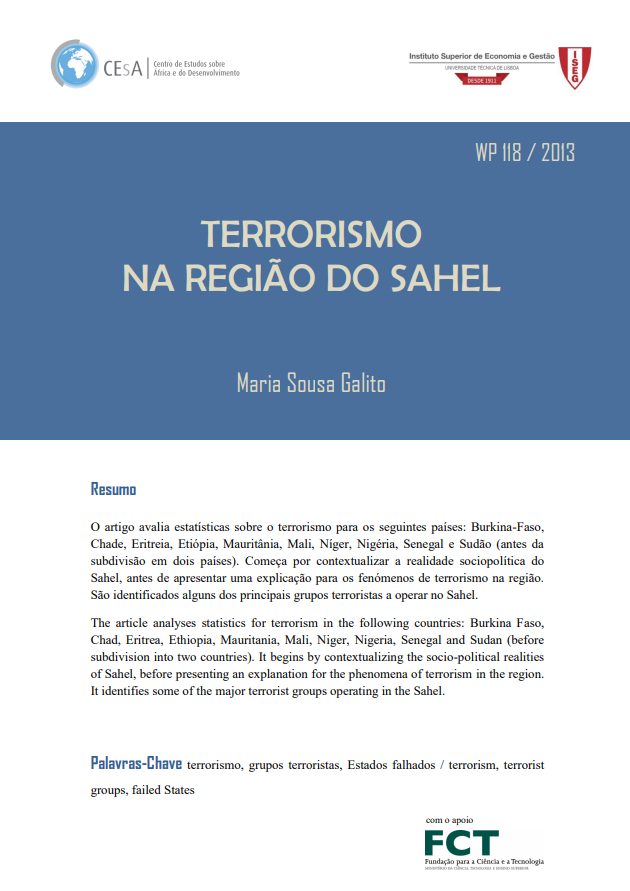
Working Paper 118/2013: Terrorismo na região do Sahel
Abstract:
Terrorismo na região do Sahel assesses terrorism statistics for the following countries: Burkina-Faso, Chad, Eritrea, Ethiopia, Mauritania, Mali, Niger, Nigeria, Senegal and Sudan (before the subdivision into two countries). It begins by contextualising the socio-political reality of the Sahel, before providing an explanation for the phenomena of terrorism in the region. Some of the main terrorist groups operating in the Sahel are identified. The article focuses its investigation on the scope of terrorism in the Sahel. After contextualising the general dynamics of that strategic area, a survey is made on the main dissident groups and on the terrorist acts registered in the Sahel. It tests the hypothesis that the context of socio-economic and political fragility (the fact that the state is considered a “failed state”) facilitates the action of certain armed groups (either guerrillas who use terrorism instrumentally, or terrorists belonging to international networks, and therefore imbued with non-political or local interests), who apply the currency of violence as a means of imposing their agenda. It is clear that the context of socio-economic and political fragility (the fact that the State is considered a “failed State”) has opened the door to freer action by armed groups, from guerrillas with political and autonomous aims, to transnational terrorist networks which take advantage of this to sell and trade drugs, weapons and people in the region, and impose violence as a means of achieving their aims, which take little account of the wellbeing of the local population.
Quotation:
Galito, Maria Sousa. 2013. “Terrorismo na região do Sahel”. Instituto Superior de Economia e Gestão. CEsA – Documentos de Trabalho nº 118/2013.
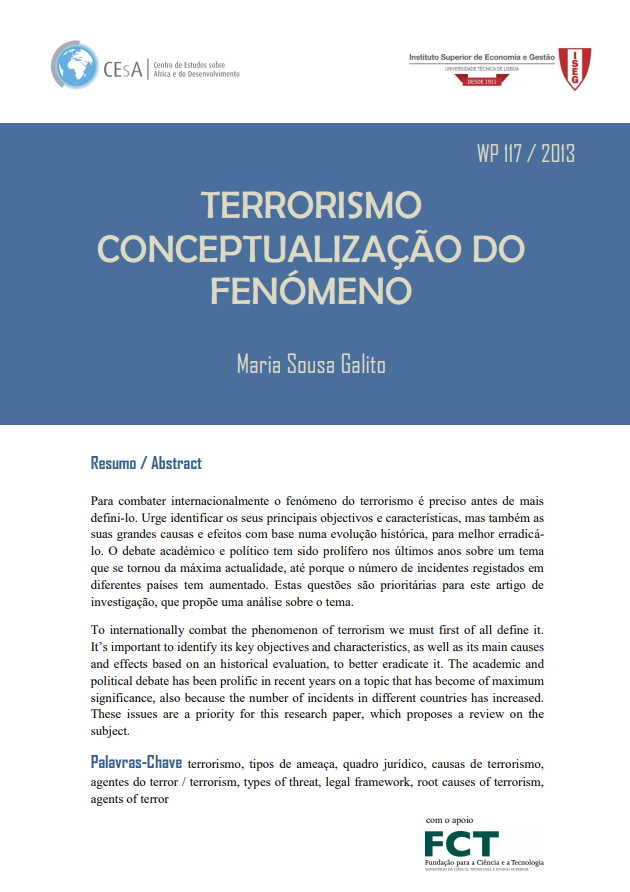
Working Paper 117/2013: Terrorismo: conceptualização do fenómeno
Abstract:
In order to combat terrorism internationally, it is first necessary to define it. It is urgent to identify its main objectives and characteristics, but also its main causes and effects based on historical developments, in order to better eradicate it. The academic and political debate has been prolific in recent years on a subject that has become highly topical, not least because the number of incidents recorded in different countries has increased. Terrorismo : conceptualização do fenómeno tests two levels of analysis. First, that the phenomenon of terrorism is complex and multifaceted, both in terms of causes and effects, so that its definition is problematic. Different concepts and types of terrorism proposed in the academic and political sphere are analysed. Its essential objectives are identified, as well as some of the main domestic and international laws adopted to eradicate it. Secondly, it seeks to clarify and interpret the limits of a phenomenon that is not new but a model of action with history. In fact, the enunciation of what terrorism is is essential so that each nation and the international community as a whole may identify the groups that may be included in this “terrorist” classification (some of those groups are listed in the annex).
Quotation:
Galito, Maria Sousa. 2013. “Terrorismo : conceptualização do fenómeno”. Instituto Superior de Economia e Gestão. CEsA –Documentos de Trabalho nº 117/2013.
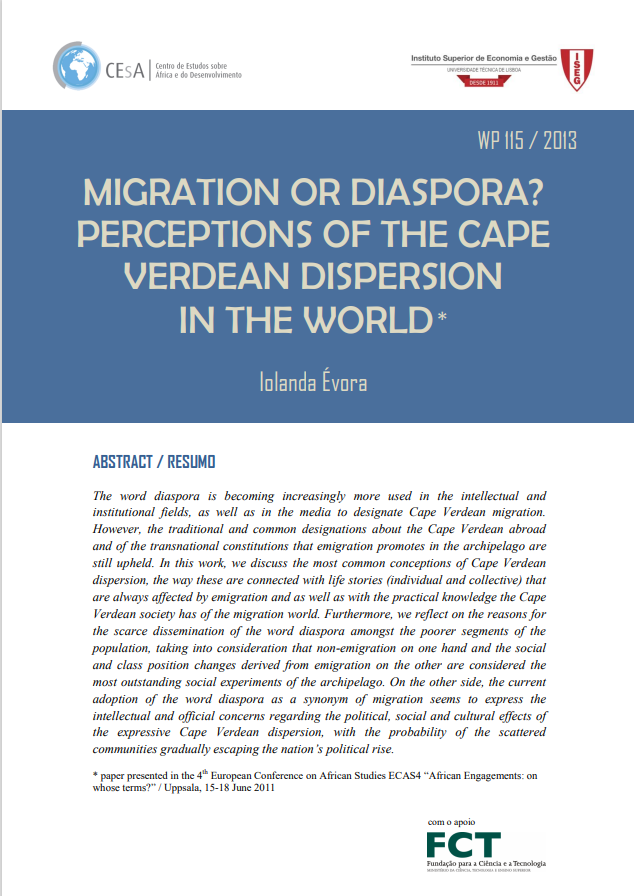
Working Paper 115/2013: Migration or diaspora? Perceptions of the Cape Verdean dispersion in the world
Abstract:
The word diaspora is becoming increasingly more used in the intellectual and institutional fields, as well as in the media to designate Cape Verdean migration. However, the traditional and common designations about the Cape Verdean abroad and of the transnational constitutions that emigration promotes in the archipelago are still upheld. In Migration or diaspora? Perceptions of the Cape Verdean dispersion in the world, we discuss the most common conceptions of Cape Verdean dispersion, the way these are connected with life stories (individual and collective) that are always affected by emigration and as well as with the practical knowledge the Cape Verdean society has of the migration world. Furthermore, we reflect on the reasons for the scarce dissemination of the word diaspora amongst the poorer segments of the population, taking into consideration that non-emigration on one hand and the social and class position changes derived from emigration on the other are considered the most outstanding social experiments of the archipelago. On the other side, the current adoption of the word diaspora as a synonym of migration seems to express the intellectual and official concerns regarding the political, social and cultural effects of the expressive Cape Verdean dispersion, with the probability of the scattered communities gradually escaping the nation’s political rise.
Quotation:
Évora, Iolanda. 2013. “Migration or diaspora? Perceptions of the Cape Verdean dispersion in the world”. Instituto Superior de Economia e Gestão. CEsA – Documentos de Trabalho nº 115/2013.
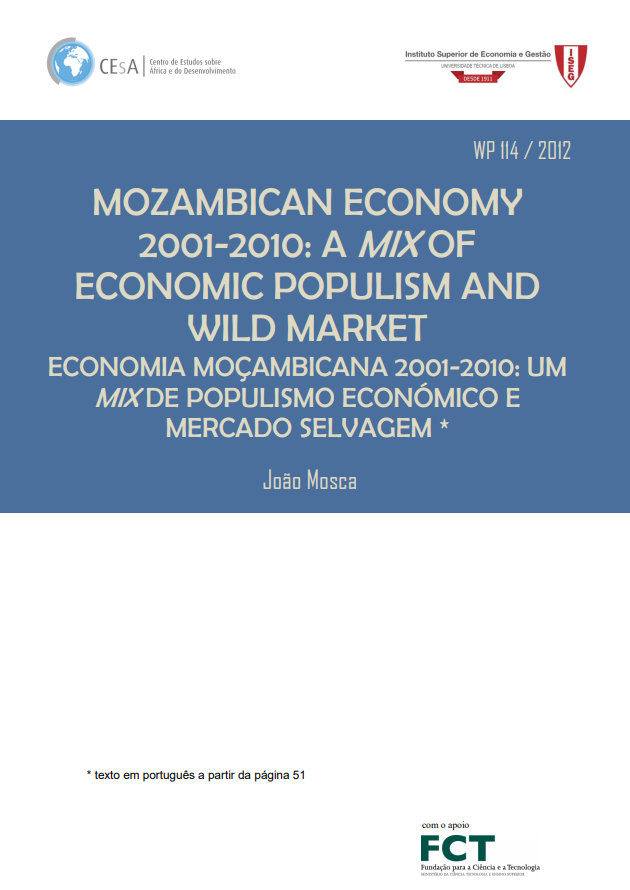
Working Paper 114/2012: Mozambican economy 2001-2010: a mix of economic populism and wild market
Abstract:
Mozambican economy 2001-2010: a mix of economic populism and wild market performs a general analysis of the economic evolution for the period comprised between 2001 and 2010 and it tries to define the main features according to an economic policy and political economy based upon paradigms of interdisciplinarity. The hypothesis of the study is to verify whether during the first decade of the 21st century there were policies and economic measures which can be defined by a growth model in which there is a combination of elements of a liberal economy at a micro level and a corporate public sector (State Capitalism) used, by the one hand, for the capture of income for the State and ruling party with off- budget financing, for the political elite and, on the other hand, for the application of redistributive measures mainly directed towards urban people so as to ensure alliances of power reproduction and the consolidation of an accumulation pattern internally focused, but centered out of the country. The practice of policies of the so-called economic populism is demonstrated through expansive monetary and budget policies, income adjustments above the inflation and high investment rates, mainly when the FDI is included. The populist nature is strengthened if the fact that the expansive policies are supported by external resources (to the State budget, in investment and in financing the balance of payments) and not by the wealth generated by the economy in public receipts is taken into consideration. Economic populism is also employed through the orchestration of public companies with politicized economic decisions. The consequence of these options were verified throughout the decade: increase of the deficit of the trade balance with growing imports; exacerbation of the dependency; high conjunctural variabilities in the exchange rate; increment of the public deficit (not including the external resources that finance the general State budget); the secundarization of the productive sectors that produce to the internal market and consequent prioritization of the exports of the large projects with the marginalization of the “traditional” productive fabric” and the externalization of the accumulation pattern. There are clear signs of the dual structure of the economy. The model of growth is not endogenous.
Quotation:
Mosca, João. 2012. “Mozambican economy 2001-2010: a mix of economic populism and wild market”. Instituto Superior de Economia e Gestão. CEsA – Documentos de Trabalho nº 114/2012.
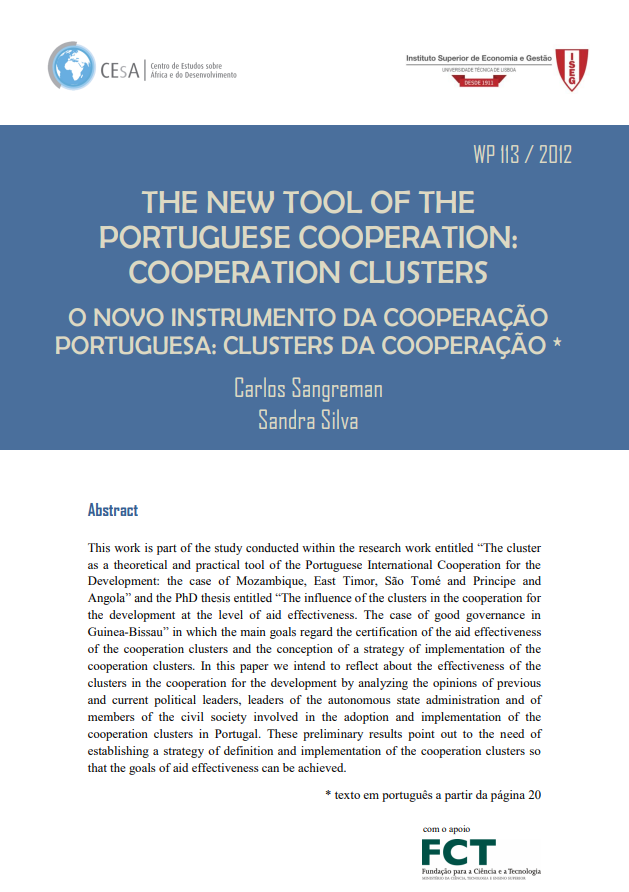
Working Paper 113/2012: The new tool of the Portuguese cooperation: cooperation clusters
Abstract:
This work is part of the study conducted within the research work entitled “The cluster as a theoretical and practical tool of the Portuguese International Cooperation for the Development: the case of Mozambique, East Timor, São Tomé and Principe and Angola” and the PhD thesis entitled “The influence of the clusters in the cooperation for the development at the level of aid effectiveness. The case of good governance in Guinea-Bissau” in which the main goals regard the certification of the aid effectiveness of the cooperation clusters and the conception of a strategy of implementation of the cooperation clusters. In The new tool of the Portuguese cooperation: cooperation clusters we intend to reflect about the effectiveness of the clusters in the cooperation for the development by analyzing the opinions of previous and current political leaders, leaders of the autonomous state administration and of members of the civil society involved in the adoption and implementation of the cooperation clusters in Portugal. These preliminary results point out to the need of establishing a strategy of definition and implementation of the cooperation clusters so that the goals of aid effectiveness can be achieved.
Quotation:
Sangreman, Carlos e Sandra Silva. 2012. “The new tool of the Portuguese cooperation: cooperation clusters”. Instituto Superior de Economia e Gestão. CEsA/Documentos de Trabalho nº 113/2012.
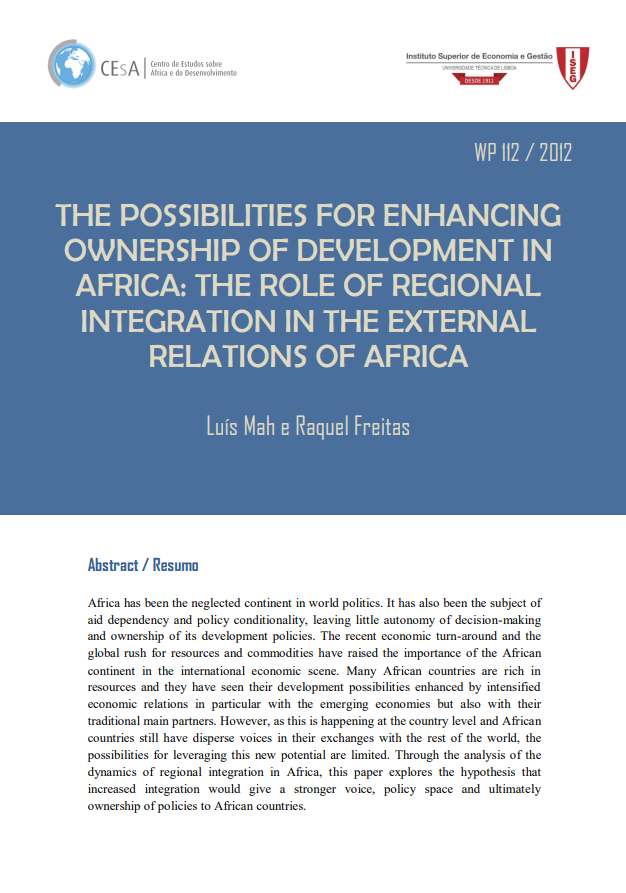
Working Paper 112/2012: The possibilities for enhancing ownership of development in Africa: the role of regional integration in the external relations of Africa
Abstract:
Africa has been the neglected continent in world politics. It has also been the subject of aid dependency and policy conditionality, leaving little autonomy of decision-making and ownership of its development policies. The recent economic turn-around and the global rush for resources and commodities have raised the importance of the African continent in the international economic scene. Many African countries are rich in resources and they have seen their development possibilities enhanced by intensified economic relations in particular with the emerging economies but also with their traditional main partners. However, as this is happening at the country level and African countries still have disperse voices in their exchanges with the rest of the world, the possibilities for leveraging this new potential are limited. Through the analysis of the dynamics of regional integration in Africa, The possibilities for enhancing ownership of development in Africa: the role of regional integration in the external relations of Africa explores the hypothesis that increased integration would give a stronger voice, policy space and ultimately ownership of policies to African countries.
Quotation:
Mah, Luís, Raquel Freitas. 2012. “The possibilities for enhancing ownership of development in Africa: the role of regional integration in the external relations of Africa”. Instituto Superior de Economia e Gestão. CEsA – Documentos de Trabalho nº112/2012.
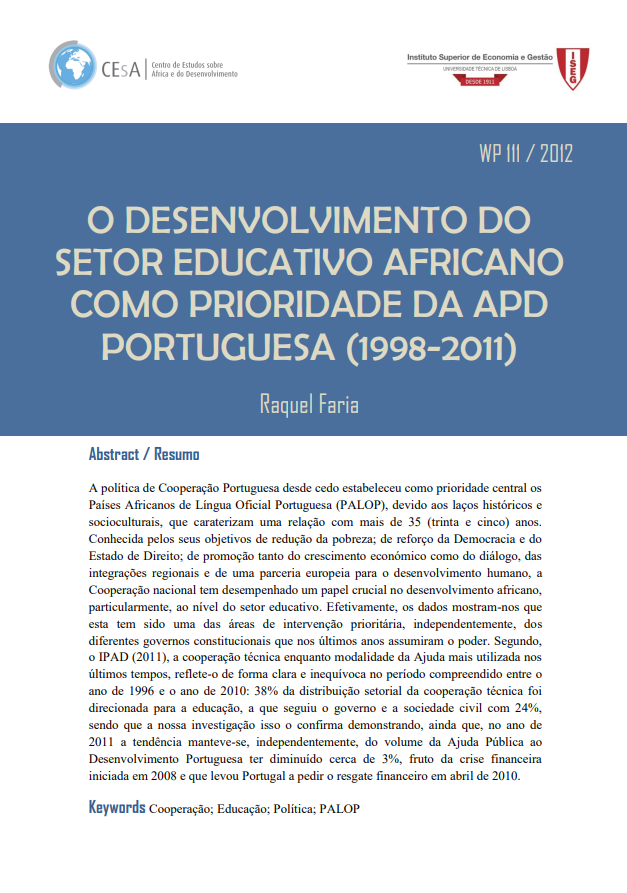
Working Paper 111/2012: O desenvolvimento do setor educativo africano como prioridade da APD portuguesa (1998-2011)
Abstract:
In O desenvolvimento do setor educativo africano como prioridade da APD portuguesa (1998-2011) we study how the Portuguese Cooperation policy early on established Portuguese-speaking African Countries (PALOP) as a central priority, due to historical and sociocultural ties, which characterize a relationship of more than 35 (thirty-five) years. Known for its poverty reduction goals; strengthening democracy and the rule of law; promoting both economic growth and dialogue, regional integrations and a European partnership for human development, national cooperation has played a crucial role in African development, particularly in the education sector. Effectively, the data show us that this has been one of the priority areas of intervention, regardless of the different constitutional governments that have taken power in recent years. Second, the IPAD (2011), technical cooperation as the most used aid modality in recent times, clearly and unequivocally reflects it in the period between 1996 and 2010: 38% of the sectoral distribution of cooperation This technique was directed towards education, followed by the government and civil society with 24%, and our research confirms this, demonstrating that, in 2011, the trend continued, regardless of the volume of Public Aid. Portuguese Development declined by around 3%, as a result of the financial crisis that started in 2008 and which led Portugal to ask for a financial rescue in April 2010.
Quotation:
Faria, Raquel. 2012. “O desenvolvimento do setor educativo africano como prioridade da APD portuguesa (1998-2011)”. Instituto Superior de Economia e Gestão. CEsA/ Documentos de Trabalho nº111/2012.
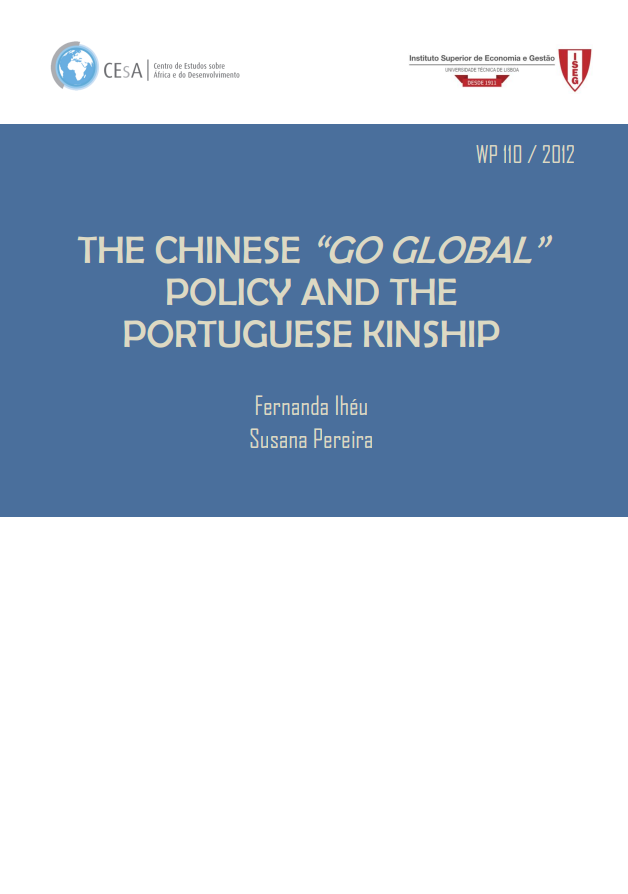
Working Paper 110/2012: The Chinese ‘go global’ policy and the Portuguese kinship
Abstract:
With the objective of promoting trade and investment and implement common projects in various domains between China and Portuguese-Speaking Countries (PSCs), the Forum for Economic and Trade Cooperation was created by the Chinese government in 2003. This Forum based in Macao, follow the theoretical rational that internationalization is largely driven by networks of relationships, very often based in a share culture and language and that the network relationships of a firm is capable of providing the context for its international activities. Being part of the soft power diplomatic approach to the Portuguese Speaking Countries – considering that some of these markets are very important for Chinese economic development, due to the need to expand its foreign markets and, most importantly, to guarantee the supply of critical raw-materials and sources of energy – this charm offensive utilizes as persuasive tools the cooperation for development, humanitarian aid, cultural ties, bilateral and multilateral diplomacy, and the OFDI. In order to be effective, this model of global cooperation requires that every participant perceives it as being mutually beneficial, i.e., a “win-win” situation for all. Therefore to be a positive contributor to the Chinese “Go Global” policy this Portuguese kinship network should have the perception that Macao Forum activities contribute to the development of its business objectives – increase exports, investment growth, and other business with positive economic results – with China, Macao and between themselves. The chinese ‘go global’ policy and the portuguese kinship was aimed at Portuguese companies (exporting and/or investing in China, Macao and HK) in order to get a clearer idea of their opinion about their perception of the Forum and its potential. Within this set of conclusions, we can consider that Macao Forum can do better for the perception of positive benefits for the Portuguese companies participating in its activities thus creating the perception of a “win-win” situation, reinforcing its utility in the increase of exports to China, growth of FDI in China, Macao and PSCs, the increase of business networks between companies of these economic spaces and the increase of business economic results in other kind of business rather than exports or investment. In the future we intend to conduct similar research on the perceptions of companies of other PSCs.
Quotation:
Ilhéu, Fernanda e Susana Pereira. 2012. “The chinese ‘go global’ policy and the portuguese kinship”. Instituto Superior de Economia e Gestão. CEsA/ Documentos de Trabalho nº110/2012.
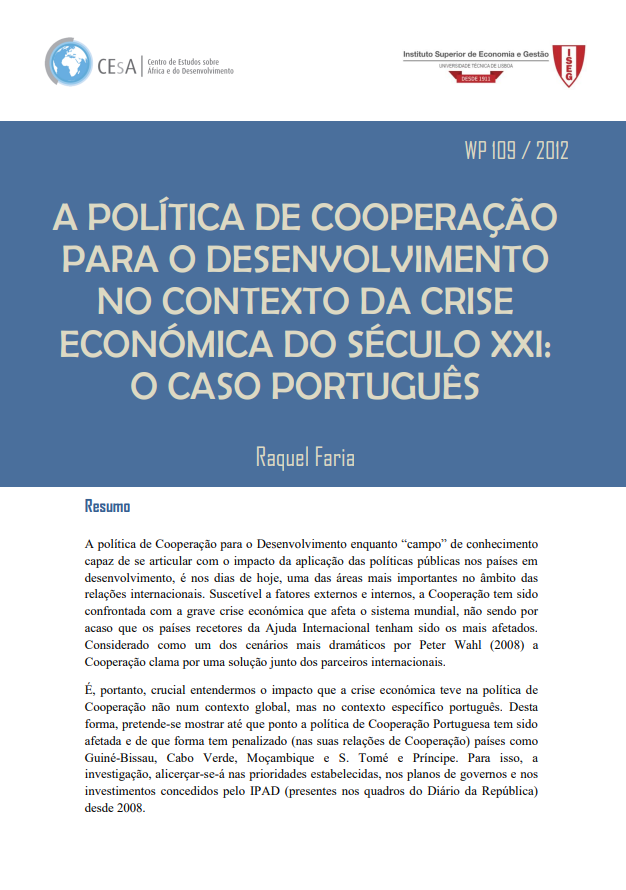
Working Paper 109/2012: A política de cooperação para o desenvolvimento no contexto da crise económica do século XXI: o caso português
Abstract:
The Development Cooperation policy as a “field” of knowledge capable of articulating with the impact of the application of public policies in developing countries, is nowadays one of the most important areas in the scope of international relations. Susceptible to external and internal factors, Cooperation has been faced with the serious economic crisis that affects the world system, and it is not by chance that the countries receiving International Aid have been the most affected. Considered as one of the most dramatic scenarios by Peter Wahl (2008), Cooperation calls for a solution with international partners. It is therefore crucial to understand the impact that the economic crisis had on cooperation policy not in a global context, but in the specific Portuguese context. In this way, A política de cooperação para o desenvolvimento no contexto da crise económica do século XXI: o caso português intends to show to what extent the Portuguese Cooperation policy has been affected and how it has penalized (in its cooperation relations) countries such as Guinea-Bissau, Cape Verde, Mozambique and S. Tomé and Príncipe. For this, the investigation will be based on the established priorities, on the government plans and on the investments granted by the IPAD (present in the tables of the Diário da República) since 2008.
Quotation:
Faria, Raquel. 2012. “A política de cooperação para o desenvolvimento no contexto da crise económica do século XXI: o caso português”. Instituto Superior de Economia e Gestão. CEsA/ Documentos de Trabalho nº109/2012.
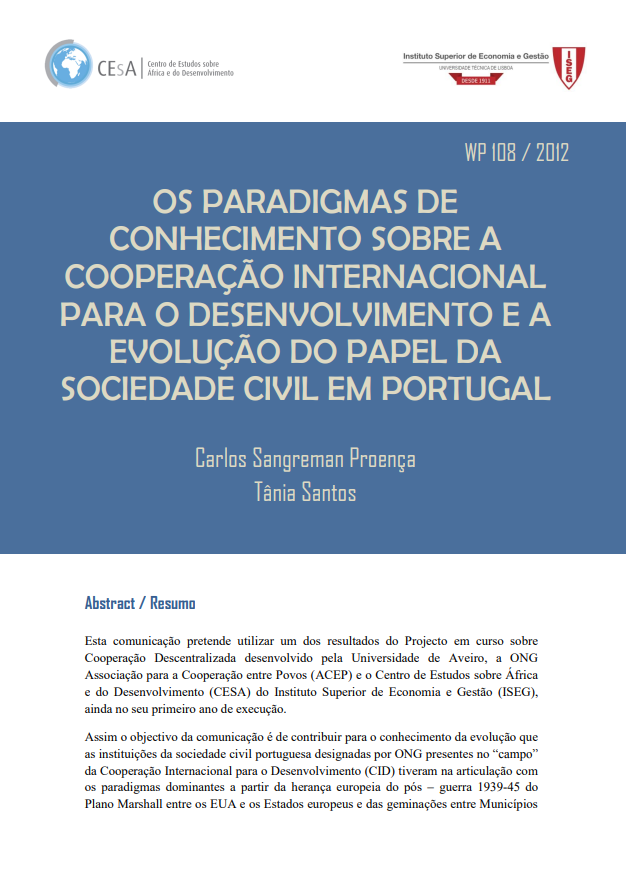
Working Paper 108/2012: Os paradigmas de conhecimento sobre a cooperação internacional para o desenvolvimento e a evolução do papel da sociedade civil em Portugal
Abstract:
Os paradigmas de conhecimento sobre a cooperação internacional para o desenvolvimento e a evolução do papel da sociedade civil em Portugal intends to use one of the results of the ongoing Project on Decentralized Cooperation developed by the University of Aveiro, the NGO Association for Cooperation between Peoples (ACEP) and the Center for Studies on Africa and Development (CESA) of the Higher Institute of Economics and Management (ISEG), still in its first year of implementation. Thus, the objective of the communication is to contribute to the knowledge of the evolution that the Portuguese civil society institutions designated by NGOs present in the “field” of International Cooperation for Development (CID) had in the articulation with the dominant paradigms from the European heritage of the post-war 1939-45 of the Marshall Plan between the USA and the European States and of the twinnings between Municipalities and other local organizations until the Global Partnership for the Development of the Millennium Goals in 2000. The conviction that the knowledge about the processes promoting development taking the economy as the engine, it created an ICD based on State Integrated Development Plans and sectoral projects that prevailed until the debt crisis of the 1970s. In this paradigm, civil society played a secondary role and State institutions were the main actor. The debt crisis led to a radical change in this paradigm, with stabilization and structural adjustment policies – the Washington Consensus – asserting themselves as the dominant model. Civil society organizations then emerged as those actors that could complement and replace the State in the belief that “the less the State the better the State”. In the realization of the failure of this model of policies that worsened poverty and inequality, and delayed the construction of Public Administration institutions in less developed countries, another paradigm is developed – the Monterrey Consensus – where civil society articulates with the State in a global partnership for development, with the central objective of fighting poverty and setting concrete global goals for the first time – the Millennium Goals. And this partnership is valid both in recipient countries and in IADC funding countries. Knowledge of how the theory and practice of this international partnership in Portugal should be is still far behind and this communication seeks to clarify these Cooperation processes and the context in which they are inserted, articulated with the ongoing reform of the Portuguese Public Administration and the CID already existing with the countries concerned.
Quotation:
Sangreman, Carlos e Tânia Santos. 2012. “Os paradigmas de conhecimento sobre a cooperação internacional para o desenvolvimento e a evolução do papel da sociedade civil em Portugal”. Instituto Superior de Economia e Gestão. CEsA –Documentos de Trabalho nº 108/2012.





